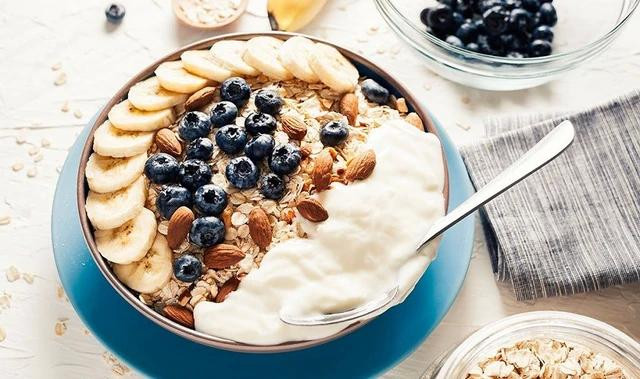What should I eat for breakfast to reduce acid reflux?
For people with acid reflux, heartburn and acid reflux can be a constant source of discomfort throughout the day. Starting your day with the right breakfast can help reduce the risk of acid reflux.
Gastroesophageal reflux is a condition of reflux of acid from the stomach into the esophagus. Normally, the esophageal sphincter acts as a valve that allows food into the stomach but does not reflux into the esophagus. When this valve does not function properly, the contents of the stomach reflux back into the esophagus and cause irritation, causing symptoms such as: heartburn, acid reflux, burning, sore throat, prolonged laryngitis.
There are many causes of gastroesophageal reflux. In addition to risk factors such as obesity, smoking, pregnancy, or the use of certain medications for asthma, antihistamines, pain relievers, sedatives, etc., an unhealthy diet is a very important cause.

There are some foods that can help reduce the symptoms of gastroesophageal reflux, but there are also some foods that tend to aggravate the symptoms of the disease. In addition, eating habits are also factors that affect gastroesophageal reflux. Therefore, in the treatment of gastroesophageal reflux, doctors advise patients to pay attention to adjusting their eating habits and food choices in addition to taking medication.
According to nutrition expert Dr. Nguyen Duc Minh, unhealthy foods such as processed foods, fatty foods, spicy foods, caffeine, alcohol, carbonated drinks, highly acidic foods (citrus fruits, pickles, tomatoes)... can increase the risk of acid reflux.
Therefore, patients should limit or avoid the above foods and pay attention to choosing foods that can help reduce reflux symptoms.
Foods that can help improve acid reflux are mainly healthy foods, rich in fiber and easily absorbed protein such as: green vegetables, fruits, fish, eggs, skinless poultry, seafood, etc. Prioritize cooking food by boiling or steaming, limit frying, stir-frying, and limit the use of strong spices.
In addition to recognizing gastroesophageal reflux as a disease requiring simple drug treatment, cooperation between doctors and patients in adjusting diet and lifestyle will help optimize drug dosage as well as comprehensive management to improve the patient's quality of life and limit complications of the disease.
2. What should I eat for breakfast to reduce gastroesophageal reflux?Oatmeal
Not only is oatmeal good for your heart, it can also absorb stomach acid, making it a great choice for controlling symptoms of acid reflux.
Whole oats are high in nutrients such as soluble fiber, protein, unsaturated fatty acids, vitamins, minerals and other phytochemicals.
Beta-glucan in oats is a soluble fiber that helps regulate the absorption of fluids from the digestive tract. It forms a gel-like substance when mixed with water. This solution coats the stomach and digestive tract. This coating feeds the good bacteria in the gut.
Therefore, eating oats regularly will help provide energy for healthy bacteria in the gut, leading to better digestion and minimizing symptoms of bloating and discomfort in the stomach and esophagus.
You can make oatmeal into many different dishes for breakfast such as: oatmeal porridge, oatmeal soup, oatmeal mixed with Greek yogurt...
Whole grains
One way to control acid reflux is to eat small, frequent meals to avoid putting pressure on the lower esophageal sphincter. A small bowl of cereal is a good way to tackle this problem in the morning. However, be careful to choose cereals that are wholegrain and have no or very little sugar.
Use almond milk instead of cow's milk to avoid aggravating acid reflux symptoms. For added sweetness and protein, mix in some fruit and chopped nuts.
Boiled eggs
Many people wonder whether eggs can cause reflux symptoms. However, this largely depends on the individual, how the eggs are prepared, and how much is eaten.
Some people find egg yolks a little more unpleasant, but most people are fine with egg whites. Egg whites are high in protein and low in fat.
It is best to avoid eggs fried in butter or oil. Hard-boiled eggs are best accompanied by a cup of ginger tea to aid digestion.
Yogurt and fruit
Although full-fat dairy often causes reflux, many people with GERD can tolerate low-fat and fat-free yogurt. Plant-based yogurts, such as almond yogurt, are also good.
Yogurt not only soothes an irritated esophagus but also provides probiotics to support the digestive tract. Add low-acid and low-sugar fruits such as peaches, apples, bananas, dragon fruit…

Nuts
Many nuts provide fiber, nutrients, and can help absorb stomach acid. Almonds, peanuts, chia seeds, and flax seeds are all healthy choices.
Ginger tea
Ginger is a spice with well-known anti-inflammatory properties and has been used for a long time to treat digestive problems. You can add ginger to your dishes or make it into tea.
One of the well-known benefits of ginger tea is that it quickly reduces nausea and is beneficial for the digestive system, effectively improving symptoms of bloating and indigestion.
The simplest way is to use 10g of fresh ginger, wash it, crush it, add boiling water or put it in a teapot, pour boiling water and steep for 10 minutes to have a cup of morning tea to help soothe the digestive tract all day long./.




